Moses Speaks Spanglish
Bilingual and torn between identities, this writer imagines Moses as a proto-Latinx figure.
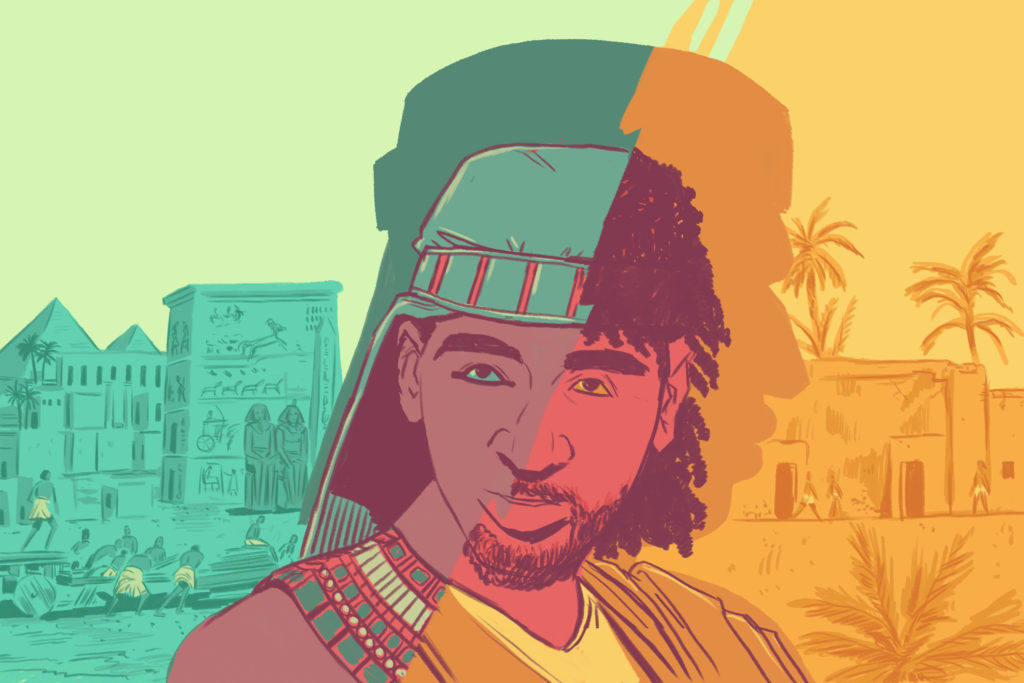
Moses. Designed for the Revealer by Zeke Peña
“Just what did she inherit from her ancestors? This weight on her back—which is the baggage from the Indian mother, which the baggage from the Spanish father, which the baggage from the Anglo? Pero es difícil differentiating between lo heredado, lo adquirido, lo impuesto.”
– Gloria Anzaldúa
“Has the name ‘Moses’ got a fixed and unequivocal use for me in all possible cases?”
-Ludwig Wittgenstein
“What does it mean that Moses entered the darkness and then saw God in it?”
-Gregory of Nyssa
***
In kindergarten, they placed me in ESL—English as a Second Language—even though I was born and raised in the United States. The year was 1996. By then, it had been over 20 years since my parents boarded an Avianca flight on the 23rd of March, trading the warmth of Barranquilla, Colombia for the cold of Long Island, New York.
I spoke mostly Spanish at home with my parents and grandmother, but English with my older siblings. When I started school my English was not terrible, even if I remember struggling with vocabulary that my peers already knew. Mercifully, my ESL stint only lasted a few years. But I’d hardly count my “progress” as a success. While I advanced in English, I regressed in Spanish.
When I see kids in bilingual programs today, I get jealous. They read, write, and do homework in two languages. During my time in elementary school, I didn’t have the option to develop my Spanish or to learn much about Latin American history and culture. The focus was on improving my English.
In the past, opposition to bilingual education in the United States relied on faulty science that claimed teaching children multiple languages would confuse them. Research by linguists and educators debunked this theory several decades ago. But many people remained hostile, deeming any bilingual education or cultural studies anti-American. It wasn’t until 2016 that California officially ended its English-only instruction in public schools. Arizona banned ethnic studies until a federal judge struck down the ban in 2017 as discriminatory. In my own educational journey I experienced confusion about my identity, but not in the ways that English-only advocates envisioned.
My early education resulted in a form of segregation within myself. English became the language in which I read, wrote, and moved through school and eventually jobs. Spanish became relegated to private conversations with my parents, older relatives, family friends, and church folk. Over time, the quality of my Spanish deteriorated. I could understand most of it, but I increasingly struggled to communicate the depths of my thoughts and feelings in Spanish.
Still, it didn’t matter how feeble my language skills were. At parent-teacher conferences, I translated. Conflict of interest? Maybe. But there I was translating my 4th grade teacher’s comments on my behavior and performance across subjects to my parents. By God’s grace, most of the news was positive. If there were discrepancies between my translations and my teachers’ reports—and I’m sure my parents could piece it together based on words like “FAILED” and “HIT A BOY,” accompanied by unhappy facial expressions—I knew something worse than a bad report card would await me.
I would say my translation duties were light compared to most. I had three older siblings who took turns helping. But I knew immigrant kids who did it all. Little homies translated everything for their parents and ipso facto were in-house editors, medical advisers, and legal aides.
My parents didn’t pressure me with language. Their priority was neither assimilation into the New World nor preservation of the Old, but making sure I focused on God and knew la Palabra de Dios. At home they continued to speak Spanish. They stopped correcting me and accepted my garbled sentences. Sometimes they adopted Spanglish-isms of their own. “¿Todos están ready para el lonche?” “Tengo que chequear.” “Por favor, eh-stop.”
Intimacy can transcend language. I’ve seen it on elementary school bus stop corners with immigrant parents conjuring conversation, exchanging words like precious beads humbly strung together. I’ve seen distant relatives shatter language, breaking through words with a love that leaps like a flame beyond its wick. I’ve seen eyes embrace in silence.
But I’ve also seen and felt the limits of such transcendence. Running out of words, you eventually run out of bridges and roads that can connect the deepest parts of you with someone else. Smiles, stares, and awkward laughter can’t transmit the glaciers in one’s soul.
I’ve never asked my parents to speak English instead of Spanish to me. How could I? Asking my parents not to speak Spanish would be like asking them to cut out their tongue. Life could go on, but a deeper understanding would be lost. I believe this is one way of showing respect to my parents who’ve made the journey here, navigating an Anglo world that can render them flat, a shadow of themselves.
But what have I lost along the way? Can my parents understand me? Can this nation ever understand me? Speaking one language or the other, is my self always left with a remainder? Straddling two ways of life, is my full self only to commune with other misfits who share the dialect of this strange place?
Although I became English-dominant, my rearing in Spanish has found ways to haunt me. I’ve said things like “I’m going to pass the vacuum,” which always made sense to me until I confused an Anglo once. Even into my 20s, there were words I only knew how to say in Spanish. I was shocked when I learned that soursop was the English word for guanábana. Soursop is such an ugly word for a delicious fruit.
I never abandoned Spanish. Classes in high school and undergrad helped me. But beyond simple conversations or expressions, I still struggle. I have to speak slowly to not butcher words. I embarrass myself, often. Like the multiple occasions in which I used tú instead of usted to address my future suegros, which is not the best way to endear yourself to potential in-laws. Asked how I am feeling, I stammer in my response like Jennifer Lopez playing Selena at a press conference in Mexico: “Me siento muy…excited.”
Plus, I’m stuck with an Americanized Spanish accent that can be spotted across an ocean. I remember my cousin from Colombia telling me I sounded like a gringo on the phone. This made me hesitant to jump into my parent’s calls, calls which once required physically going to the deli to purchase BOSS-brand international calling cards. The smallest comments about my accent cut my confidence, making me reluctant to speak. But what did I expect? That I could escape the fact of my Americanness?
At every turn, shame pricks the tip of my tongue. Shame for having an accent. Shame for not having the right type of accent. Anger when someone is surprised I can speak English “well.” Dominating English, ¿ or English dominating me?, has allowed me to advance professionally and has given me access to the lingua franca of the world. But that, in itself, has never made me feel whole. I was born in this country, I’ve traveled to the motherland, but it feels like I’m still searching for home.
***
My mom tells me that, of all the Coritos we sang in Iglesia Metodista Unida Hispana De Hempstead when I was a child, one of my favorites was Juan Carlos Alvarado’s rendition of “Los Carros del Faraón.” This song celebrates the destruction of Pharaoh’s chariots that chased the newly free Hebrews in the Exodus story. I liked the fast pace of the song. While I looked forward to belting out the scatting portion that went “La la la la la la,” I suspect some adults around me meditated on a holy escape, on God’s protection from the chariots of death that hounded them over there or over here.
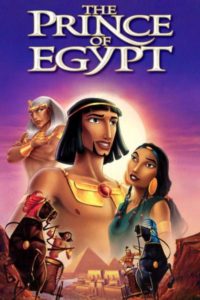
Dreamworks’ 1998 animated film, The Prince of Egypt
This story from the Torah has reverberated for millennia. It’s been absorbed into Christian and Islamic canons. In the 1st century of the common era, Philo of Alexandria painted a biographical sketch of Moses as the ideal philosopher-king. In the 19th century, Harriet Tubman earned the moniker “Moses” for helping to free over 300 enslaved African Americans. Besides learning about Moses in church, I saw him depicted in films like The Ten Commandments (1956) starring Charlton Heston, and Dreamworks’ The Prince of Egypt (1998), which I remembered for Mariah Carey and Whitney Houston’s duet “When You Believe.”
The Exodus text begins with politically subversive women. Fearing that the population of enslaved Hebrews—later known as the ancient Israelites—were becoming too numerous, Pharaoh enacts a policy to control this community’s birthrate. But Shiphrah and Puah, midwives to the Hebrew women, disobey Pharaoh’s edict to kill male Hebrew babies. Pharaoh then commands that every Hebrew baby boy be separated from its mother and tossed into the Nile river. Moses is born with a target on his back. Through the cunning of his biological mother and sister, Moses miraculously survives in a papyrus basket plastered with bitumen that floats to Pharaoh’s daughter who adopts him. For a season, the child Moses is nursed by his Hebrew mother. This child grows up and, one day, reluctantly heeds a divine call to confront the Egyptian ruler’s oppression of the Hebrews.
Moses’ birth narrative draws on motifs that pervade ancient literature, including that of the Akkadian and Egyptian Empires. Like the Moses story, Sargon of Akkad’s mother places him in a reed basket sealed with bitumen on the river, which carries him to Aqqi, who adopts Sargon as a son. Isis hides her son Horus in papyrus marshes from Seth, the ruler that Horus will grow up to depose.
It wasn’t until I re-read Exodus later in life, after graduate school in religion and years of reflecting on my identity, that I noticed the particular tensions within Moses’ identity as the story unfolds. His identity crisis reaches a crescendo in the litany of excuses Moses makes when God first calls him from a burning bush. The exchange goes something like this:
God: The cry of the Israelites has come to me; I have seen how the Egyptians oppress them. I will send you to Pharaoh to bring my people, the Israelites, out of Egypt.
Moses: But who am I that I should go to Pharaoh, and bring the Israelites out of Egypt?
God: I will be with you.
Moses: But If I come to the Israelites and say to them, ‘The God of your ancestors has sent me to you,’ and they ask me, ‘What is his name?’ what shall I say to them?
God: I am who I am.
Moses: But I have never been eloquent, neither in the past nor even now that you have spoken to your servant; but I am slow of speech and slow of tongue.
God: Who gives speech to mortals?
Moses: O my Lord, please send someone else.
When I now read that Moses told God not to send him because he lacked eloquence and was slow of tongue, I wonder if Moses had an accent. That would make sense considering that Moses was born a Hebrew, raised as an Egyptian, and exiled to Midian. Based on Moses’ words, textual commentators have speculated whether Moses had a speech impediment or a fear of public speaking. Some rabbis of the Talmud suggest a young Moses burned his tongue with a piece of a coal. But I wonder: What if Moses was also self-conscious about his broken Hebrew? Or, what if he had forgotten his Hebrew? What if Moses’ society saw his Hebrew-Egyptian Spanglish as a lack of eloquence?
My imagination runs between the lines of this story. Moses is caught in between. But in another way, so is his mother. Like many mothers, she relocates her child for survival and a better chance at life. Yet, it must have been a difficult choice. She sends her child to the very heart of the royal court that has contributed to the oppression of her people.
What is going through Moses’ mind? He was born to a people oppressed, but raised and educated in the heart of this empire. What did he think when he looked out of the windows of the palace and heard the familiar tongue of those laying bricks for others who barely acknowledged their humanity?
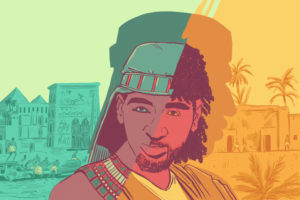
Moses. Designed for the Revealer by Zeke Peña
Moses couldn’t neatly separate a public and private identity. His citizenship couldn’t escape the power dynamics that existed between them. Although Moses individually ascends, his destiny remains linked with a community that is systematically mistreated.
Moses grows up in the Egyptian palace but notices the Hebrews’ forced labor. One day, he kills an Egyptian who’s beating a Hebrew. With news of his deed spreading, and his own life endangered, Moses flees to Midian in northwest Arabia. Sitting beside a well, he witnesses a group of shepherds drive out a group of seven sisters who were getting water for their father’s flock. Moses rises to their defense. When the sisters return to their father and recount what happened, they identify Moses as an Egyptian. Moses goes on to marry one of the sisters, Zipporah, and they have a son whom he names Gershom (“Stranger There”).
When Moses first encountered Zipporah and her sisters in Midian, they identified him as an Egyptian. Perhaps he was assimilated in appearance. Either way, Moses is going through an identity crisis. He names his son “Stranger There” because, he explains: “I have been a stranger residing in a foreign land.” The place, the “there” in the text, remains ambiguous. Maybe Moses feels like a stranger in Midian, or felt like a stranger in Egypt. Moses might have felt like a stranger most of his life.
In describing himself as a stranger, Moses uses the Hebrew word commonly used in the Torah to describe foreigners: גֵּר (ger). It’s the same word used in Exodus 23:9: “You shall not oppress a stranger (ger); for you know the heart of a stranger, for you were strangers in the land of Egypt.” Making space for others begins with making space for your own complicated self.
***
I might dare call Moses a proto-Latinx figure. He’s caught between political and cultural pressures that resemble what some younger Latinxs face today. Like the ancient Hebrews in Egypt, our community is seen as a threat—to national security, but really to this nation’s allegedly white cultural fabric.
Political commentators repeatedly employed the metaphor of the “Sleeping Giant” to describe the inevitable way surging Hispanic demographics would translate into power and remake the nation. Some white Americans took this as a warning. In a 2009 article titled “The Hispanic Challenge,” the late Harvard University professor Samuel P. Huntington described Latin American immigrant fertility rates as “the single most immediate and most serious challenge to America’s traditional identity.”
Donald Trump’s presidency became the boiling point of anti-immigrant sentiment that had been simmering for several years. Like the Pharaoh described in Exodus, Trump has responded to cries for compassion with a particularly calloused heart. Through rhetoric and policy, he has echoed the worst nativism of this nation’s history, conflating brown immigrants with criminality and separating children from their parents, among other things.
The Pharaoh in Moses’ story approached the Hebrew people as dangerous invaders in spite of the fact that they had been there for generations. It didn’t matter that they had originally arrived in Egypt as refugees during a famine or had helped build up the kingdom. Similarly, although cheap Latinx labor has been used to build and maintain the United States, Latinx immigrants have become scapegoats for everything that’s wrong in society. How or why we ended up here remains an afterthought.
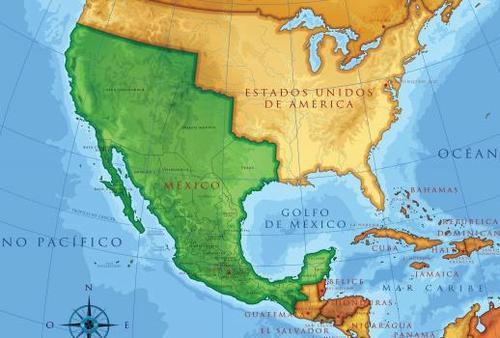
Pre-Mexican American War
Latinx migration has often been the boomerang effect of America’s imperial meddling in the other America, which it has treated as a backyard playground. Before we came to the United States, the United States came to us in the form of territorial annexations, monopolistic fruit companies, actual invasions, colonial occupations, orchestrated coups, shock doctrines, death squads, failed drug wars, neoliberal trade agreements, and a lie called the American Dream.
Recent waves of migration don’t alter the fact that our peoples have been here since the founding of the United States. Spanish was spoken in this land long before English. By the time the English settlers landed in Virginia in 1607, it had been 94 years since Juan Ponce de León had landed in Florida. This nation’s oldest known church, which dates back to 1610, is the San Miguel Mission. When the United States border crossed into Mexico and enveloped numerous Mexicans in 1848, many articulated their new American citizenship in Spanish. The myth of American exceptionalism is often pegged to an exclusively white, English, and Protestant foundation. The Latina writer María Ruiz de Burton was challenging this hypocrisy in 1872.
We are not foreign. But “we,” who? I refer to those of us who—for better or for worse—have been thrown together underneath an umbrella term that shades us, whether you consider the umbrella benign or problematic. We were once mostly scattered nationalities. Mexicans. Puerto Ricans. Cubans. And so on. Then activists, government bureaucrats, and media executives collaborated to invent the “Hispanic” category that first appeared in the 1980 Census. In order to not reduce our identity to Spain and the Spanish language, we became Latino. In an effort to be gender inclusive, we’ve become Latino/a, Latina/o, Latin@, and Latinx.
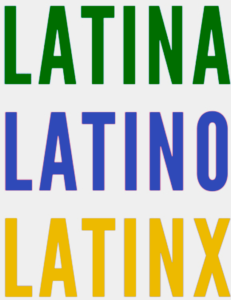 Many Americans debate what Latinxs will become in the future and how our assimilation, or lack thereof, might change the cultural landscape. The hidden question is this: Can Latinxs become white? Whiteness within the United States has proven to be a malleable hierarchy that can evolve over time and incorporate newcomers. Still, Latinxs are not uniform. We’re unlike earlier European immigrants, and we fall across a wide spectrum in terms of physical appearance and ancestry.
Many Americans debate what Latinxs will become in the future and how our assimilation, or lack thereof, might change the cultural landscape. The hidden question is this: Can Latinxs become white? Whiteness within the United States has proven to be a malleable hierarchy that can evolve over time and incorporate newcomers. Still, Latinxs are not uniform. We’re unlike earlier European immigrants, and we fall across a wide spectrum in terms of physical appearance and ancestry.
In Latin America, the term mestizaje has been used to describe our mixed reality. Derived from mestizo, a term the Spanish used to categorize the offspring of a Spanish father and Indigenous mother, mestizaje highlights not only the mixing of peoples, but the mixing of cultures.
José Vasconcelos, an influential Mexican leader in the early 20th century, wrote about mestizaje as an ideal that created a new “cosmic race.” On the one hand, Vasconcelos pushed back against the race science of his time that promoted Anglo-Saxon superiority. On the other, his vision reduced Indigenous and African peoples to stepping stones on the way to a higher racial fusion.
The poet José Martí criticized the racism and historical short-sightedness of the United States when he wrote about nuestra America. At the same time, in “Mi Raza,” Martí viewed his native Cuba through a colorblind lens that downplayed the struggles of Afro-Cubans. The desires for racial unity and a mixed future can be, and sometimes have been, grounded in anti-blackness and anti-indigeneity.
On a certain level, mestizaje—whether as a descriptor or ideal—never fundamentally addressed the issues of power that resulted from the conquest of the Americas and independence from Spain. Latin America has always had a race problem, even if the way race is imagined and discussed (or not) is somewhat different than how it is imagined and discussed in the United States, where race has historically operated in a black/white binary.
Against this backdrop, it’s not clear what Latinxs will become once we are transposed here. In the United States, some lighter-skinned Latinxs might pass or attempt to pass as “white.” Others might find themselves in the limbo of being “off-white,” of never being fully white even while carrying privileges associated with lighter skin. Darker-skinned Latinxs may get coded as black or foreign. Other factors such as mixed partnerships and geographical location could also pull Latinxs in different directions. Are Latinxs the next immigrants to become white? It all depends. “We,” who?
The adoption of the term Latinx, like the idea of grouping us as a collective, is deeply contested. But I like the way this term symbolizes a kind of in-betweenness.
For me, Latinx captures a fluidity in gender and more. Latin-X points to future possibilities, to multiple directions like Latin-XYZ. When I think of Latinx, I think of Exodus. We come from the other America. Our bodies, a battered all-American bridge. X marks the spot, the crossroads many of us find ourselves in. We’re figuring out who we are here and this is not neutral. We can assimilate into systems of oppression or chart paths of liberation. When I think of Latinx, I think of Moses.
Will I speak with the tongue I have, not the one I wish I had? Will I speak truth to power—even when I’m awkwardly attached to it as an American? My identity can be the result of forces out of my control, but Moses’ story tells me that what I make of it and who I become is still something I decide.
***
I’ve been using Moses as an allegory for Latinx identity and vice versa. But if I extend this allegory further, it leads me to places I’d rather not go. Because this story of deliverance quickly turns into a story of conquest. God tells Moses that his people will enter and possess the “promised land.” The problem: this land already had inhabitants collectively labeled the Canaanites.
God commands the ancient Israelites to exterminate the indigenous inhabitants of Canaan. Moses dies before the Israelites make it to this promised land. But the next generation, led by Joshua, carries out the conquest, entering towns and slaughtering men, women, and children. Joshua 11:11 says the Israelites “totally destroyed them, not sparing anyone that breathed.”
In the article “Canaanites, Cowboys, and Indians,” written in 1989, Native American scholar Robert Allen Warrior challenged how Christian liberation theologians used the Exodus story. Christians of all colors have often adopted Exodus in their own freedom struggles without addressing the narrative’s baggage, including its use against Native Americans. In the early colonial era of the United States, white Christian settlers saw themselves as a chosen people, this land as their inheritance, and Native Americans as “Canaanites” worthy of either conversion or extermination. Deliverance for some meant erasure for others.
For Warrior, the fact that scholars doubt the historical accuracy of this biblical conquest story doesn’t lessen the horror of this genocidal fantasy. In reality, the Canaanites were not wiped out and the emerging Israelites shared their culture. Within the story, though, the annihilation of the Canaanites is sanctioned by God. The story is read, reread, and used to justify violence that is real. “As long as people believe in the Yahweh of deliverance,” Warrior writes, “the world will not be safe from Yahweh the conqueror.”
Is the God who meets Moses in his insecurities and hears the cries of oppressed people the same God who orders genocide? No canon, creed, or church can redeem the horror of that violence.
Moses’ story can hold another lesson. Warrior says, “A delivered people is not a free people.” I take that to mean that trying to escape violence from one place does not grant one innocence in the ongoing violence of another place.
I could say “we are all immigrants” when that’s simply not true. If I am to make a home in this land, then I should consider its earlier inhabitants and those enslaved to work it. I should remember that the “Battle Hymn of the Republic” sung by abolitionists and civil rights leaders was set to the tune of “On Canaan’s Happy Shore.” If I am to read the Bible honestly, then I must accept—as Womanist theologian Delores Williams points out in Sisters in the Wilderness—that the violence that runs through Moses’ ancestral lineage begins with Abraham and Sarah’s violence against Hagar, an enslaved Egyptian woman.
Who will I become in the narrative of the United States? The story of Moses reminds me that I can experience oppression and easily oppress others. Not in some fallacious “reverse-racism” type of way, but in ways that harm nevertheless. Embracing my culture doesn’t negate that. Proudly speaking Spanish among racist Anglos won’t absolve me. I wish the problems could end with the colonists kicked out, the tyrannical leader removed. I am still left with what courses through me. I am still left attempting to reclaim—what exactly? The Spanish word guanábana is actually derived from a Taíno word. When I look in the mirror, I see that my body is the story of conquest written in flesh and blood.
Daniel José Camacho is a writer and editor. His work has appeared in The Guardian, Sojourners, ABC Religion & Ethics, TIME, and the Washington Post. He has a B.A. in Philosophy from Calvin College and an M.Div. from Duke Divinity School.
***
Published with support from the Henry R. Luce Initiative on Religion in International Affairs.